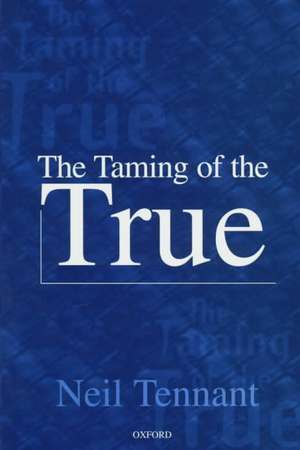The Taming of the True
Autor Neil Tennanten Limba Engleză Hardback – 3 iul 1997
Preț: 808.32 lei
Preț vechi: 1222.00 lei
-34% Nou
Puncte Express: 1212
Preț estimativ în valută:
154.67€ • 161.92$ • 127.98£
154.67€ • 161.92$ • 127.98£
Carte tipărită la comandă
Livrare economică 25-31 martie
Preluare comenzi: 021 569.72.76
Specificații
ISBN-13: 9780198237174
ISBN-10: 0198237170
Pagini: 484
Ilustrații: numerous diagrams
Dimensiuni: 164 x 243 x 28 mm
Greutate: 0.82 kg
Editura: OUP OXFORD
Colecția OUP Oxford
Locul publicării:Oxford, United Kingdom
ISBN-10: 0198237170
Pagini: 484
Ilustrații: numerous diagrams
Dimensiuni: 164 x 243 x 28 mm
Greutate: 0.82 kg
Editura: OUP OXFORD
Colecția OUP Oxford
Locul publicării:Oxford, United Kingdom
Recenzii
Neil Tennant "tames the True" by showing that nothing worth wanting as true in mathematics or natural science ranges beyond the limits of human knowledge. Any thing worthy of the name true in mathematics or natural science is in principle knowable ... Chapters 2 and 3 of Tennant's book make a significant contribution with their careful analyses of philosophical terms such as `realism', `anti-realism', and `irrealism' ... Those who work in these areas need to study all of Tennant's book for it moves the arguments and issues significantly forward. The book offers a comprehensive philosophy of mathematics and natural science
[Tennant's] book addresses a number of important issues in contemporary philosophy, and the reader has much to gain from a careful study of the development. Few stones are left unturned [in] this rich study.
[Tennant's] book addresses a number of important issues in contemporary philosophy, and the reader has much to gain from a careful study of the development. Few stones are left unturned ... this rich study ... presents a delightful and compelling holistic argument against Kripke's meaning-sceptic ... a new, improved version of the manifestation argument, and provides a revival of the positivist notion of `cognitive significance'. The author provides a rigorous criterion aimed at demarcating `the empirically meaningful from the metaphysically meaningless'. He shows that his distinction avoids the now-standard refutations of the notion of cognitive significance.
This is a new major and systematic monograph on the realism debate, written by a very skilful and sophisticated defender of anti-realism ... Tennant attempts to show that [intuitionistic relevant] logic has much wider application than one might suppose. It suffices not only for mathematics but also adequately captures the basic inferential practices of empirical sciences. It would be hard to overestimate the significance of that attempt, since if successful it undermines the charge that anti-realism is a doctrine that cannot really be extended beyond the domain of mathematical discourse.
'This is a bold book, perhaps even a brave book ... a book broad in scope, and certainly a good book ... Anyone interested in the realist/anti-realist controversy, whichever side she takes, should read it, for it presents the most sophisticated defence of moderate anti-realism to date.'
Tennant's views ... constitute quite a unique blend. They not only correct, or modify, or supplement some of Dummett's arguments, including the famous manifestation requirement, but also put the whole [anti-realist] research programme in a quite different metaphilosophical setting, more congenial to the idea of naturalized philosophy ... The book is very lucidly written, and the main arguments are well signposted, presented and summarized. ... it is a very advanced work.
[Tennant's] book addresses a number of important issues in contemporary philosophy, and the reader has much to gain from a careful study of the development. Few stones are left unturned [in] this rich study.
[Tennant's] book addresses a number of important issues in contemporary philosophy, and the reader has much to gain from a careful study of the development. Few stones are left unturned ... this rich study ... presents a delightful and compelling holistic argument against Kripke's meaning-sceptic ... a new, improved version of the manifestation argument, and provides a revival of the positivist notion of `cognitive significance'. The author provides a rigorous criterion aimed at demarcating `the empirically meaningful from the metaphysically meaningless'. He shows that his distinction avoids the now-standard refutations of the notion of cognitive significance.
This is a new major and systematic monograph on the realism debate, written by a very skilful and sophisticated defender of anti-realism ... Tennant attempts to show that [intuitionistic relevant] logic has much wider application than one might suppose. It suffices not only for mathematics but also adequately captures the basic inferential practices of empirical sciences. It would be hard to overestimate the significance of that attempt, since if successful it undermines the charge that anti-realism is a doctrine that cannot really be extended beyond the domain of mathematical discourse.
'This is a bold book, perhaps even a brave book ... a book broad in scope, and certainly a good book ... Anyone interested in the realist/anti-realist controversy, whichever side she takes, should read it, for it presents the most sophisticated defence of moderate anti-realism to date.'
Tennant's views ... constitute quite a unique blend. They not only correct, or modify, or supplement some of Dummett's arguments, including the famous manifestation requirement, but also put the whole [anti-realist] research programme in a quite different metaphilosophical setting, more congenial to the idea of naturalized philosophy ... The book is very lucidly written, and the main arguments are well signposted, presented and summarized. ... it is a very advanced work.
Notă biografică
Neil Tennant is Professor of Philosophy and Adjunct Professor of Cognitive Science at Ohio State University. He previously held chairs at the University of Stirling, Scotland, and at the Australian National University. He has held visiting professorships or fellowships at Munich, Cambridge, Michigan, Pittsburgh, and Dartmouth College.
